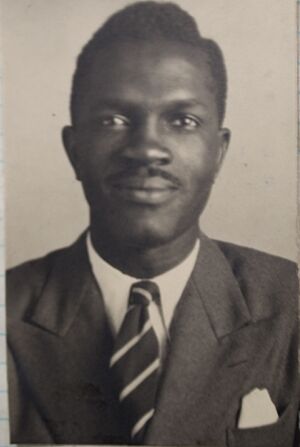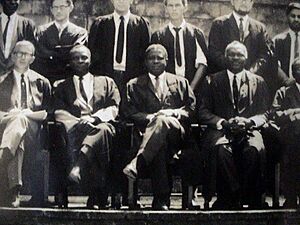Davidson Nicol facts for kids
Quick facts for kids
Davidson Nicol
|
|
|---|---|

Nicol c. 1948
|
|
| Born | 14 September 1924 Bathurst, Sierra Leone |
| Died | 20 September 1994 (aged 70) Cambridge, England |
| Pen name | Abioseh Nicol |
| Occupation |
|
| Spouse |
Marjorie Johnston
(m. 1950) |
| Children | 5 |
Davidson Sylvester Hector Willoughby Nicol (14 September 1924 – 20 September 1994), also known as Abioseh Nicol, was an important person from Sierra Leone. He was a doctor, a diplomat, and a writer.
Nicol made big discoveries about how the human body uses insulin. This helped a lot with diabetes research. He earned degrees in many different subjects like arts, science, and business. He also contributed to science, history, and literature.
Nicol was the first black African to graduate with top honors from the University of Cambridge. He was also the first black African chosen as a fellow of a college at Cambridge University.
Early Life and Education
Davidson Sylvester Hector Willoughby Nicol was born on 14 September 1924. His birthplace was Bathurst, Sierra Leone. His parents were Jonathan Josibiah Nicol and Winifred Clarissa Regina Willoughby.
He taught at the Prince of Wales School in Freetown. Freetown is the capital city of Sierra Leone. Later, he received a scholarship to study at Christ's College, Cambridge University in the United Kingdom. He earned a degree in natural science in 1947. He was the first black African to graduate with top honors from Cambridge.
He then earned a medical degree from London Hospital Medical College. On 11 August 1950, he married Marjorie Johnston from Trinidad. They had five children together.
In the early 1950s, Nicol taught at the Ibadan University medical school. He researched malnutrition there. He returned to Cambridge in 1954. In 1957, he became the first black African Fellow at Christ's College. He researched insulin with the famous scientist Frederick Sanger. Nicol wrote two books about insulin in 1960. They were called The Mechanism of Action of Insulin and The Structure of Human Insulin. In 1958, he went back to Freetown. He worked for the Sierra Leonean government as a pathologist.
Working in Academia
In 1960, Nicol became the first African principal of Fourah Bay College in Freetown. He held this job for eight years. During his time as principal, he greatly expanded the college. Nicol was also a member of the Public Service Commission until 1968.
He continued his work in university leadership in Sierra Leone. He was the chairman of the University of Sierra Leone from 1964 to 1968. Then he became the Vice-Chancellor of the university from 1966 to 1968. In 1964, he received the honor of being appointed a CMG.
Diplomatic Career
Nicol left his university work in 1968. He became Sierra Leone's permanent representative to the United Nations (UN). He served in this role until 1971. That year, he became Sierra Leone's High Commissioner to the United Kingdom. This job ended in 1972.
From 1972 to 1982, Nicol worked as the Under-Secretary-General of the United Nations. He worked under Kurt Waldheim. While in this job, Nicol also led the United Nations Institute for Training and Research (UNITAR). He was also an ambassador for Sierra Leone to Norway, Sweden, and Denmark at one point. In September 1970, he was the President of the United Nations Security Council.
Later Years and Writings
Nicol kept a home in Cambridge, England, for many years. He often visited Christ's College, where he was an honored Fellow. From 1987 to 1991, he was a visiting professor of International Studies. He taught at the University of California (1987–88) and the University of South Carolina (1990–91).
Nicol retired in 1991 when he was 67 years old. He returned to Cambridge, where he passed away on 20 September 1994, at the age of 70. He was also the president of the World Federation of United Nations Associations from 1983 to 1987.
Nicol was also a published writer. In 1965, he published Two African Tales. He wrote short stories, poetry, music, and academic books. He also wrote a biography of Africanus Horton. Horton was an early Sierra Leonean author. He was also one of the people who started African nationalism. Nicol's last published work was Creative Women in 1982.
 | Janet Taylor Pickett |
 | Synthia Saint James |
 | Howardena Pindell |
 | Faith Ringgold |


